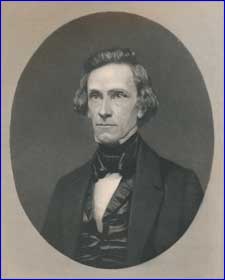The Apostle to the Coal Fields of Pennsylvania
Written by davidtmyers
Have you ever had the experience of believing firmly that your Christian calling in life was to some place, and then at the last moment, you were denied that expectation of service? If this resonates with you, then you will appreciate the post today, for that was the experience of our subject.
 His name was Richard Webster. Born on this day July 14, 1811, he was the youngest child of Charles and Cynthia Webster, of Albany, New York. His father was a book seller in that town, and the publisher of an influential newspaper in Albany. But of far greater importance, both parents were committed Christians and members of the First Presbyterian Church. Reared then as a child of promise, Richard early professed his faith in Jesus as Lord and Savior. Joining the church of his parents, he began to develop his Christian faith, so that it was begun to be said that “no one could mistake the purposes of his life.”
His name was Richard Webster. Born on this day July 14, 1811, he was the youngest child of Charles and Cynthia Webster, of Albany, New York. His father was a book seller in that town, and the publisher of an influential newspaper in Albany. But of far greater importance, both parents were committed Christians and members of the First Presbyterian Church. Reared then as a child of promise, Richard early professed his faith in Jesus as Lord and Savior. Joining the church of his parents, he began to develop his Christian faith, so that it was begun to be said that “no one could mistake the purposes of his life.”
After graduating from college, he entered Princeton Theological Seminary in 1832 where he sat under the teaching of such spiritual giants as Charles Hodge, Samuel Miller, and Archibald Alexander.
Having a great intelligence, he excelled in his understanding of theology, even continuing long after seminary to study the Scriptures in their original languages, rather than letting those disciplines fall away. He possessed more than a “warm social feeling” in finding humor in himself and other places, bring laughter to many a good friend.
Some serious physical ailments came to plague him in seminary, which were that of deafness and near sightedness. As his life went on, both became more pronounced in severity, but he did not let these deficiencies block his desire to serve the Lord. Believing that he possessed a call to the foreign mission field, he applied to the Board of Foreign Missions of the Presbyterian Church. But literally, at the last moment, he received strong signs that this was not God’s will for his life. He was saddened, to say the least.
Despite that change of calling, after ordination, he began to minister in the destitute coal towns of Pennsylvania. Traveling to what is now called Jim Thorpe, then called Mauch Chunk, Pennsylvania, he began to evangelize sinners and edify the saints of God. Believing that Calvinism and Presbyterianism were Scriptural, and part of apostolic Christianity, he organized the Presbyterian Church in that town with 24 members. But he didn’t just stay there, he went to all the rough camps of coal miners in the region, where there was a low state of religion. The gospel went with him, with eventually twelve churches established in six counties. In fact, an entire presbytery was established by the General Assembly to represent all of those churches which he was instrumental in beginning.
In 1838, he married Elizabeth Cross, who gave him a home, and a full one at that, with six children (and some say seven children) born to the union. His deafness increased in time, making life and ministry more difficult. But he continued on, even writing a book of the History of the Presbyterian Church in America from its beginnings to 1760. That book is available both in print and on the Web now. Rev. Webster would go to be with his Lord and Savior on June 19, 1857, just shy of 45 years of age.
Words to Live By:
It was said by one parishioner that his conversations with the sinful inhabitants of that area of Pennsylvania were always conducted in “a strain of extreme tenderness, beseeching them, by the mercies of God, to turn from their evil ways” and trust in Christ. Oh to have more soul-winners among professing Christians today, with a firm confidence in the Scriptural promise that “as many as had been appointed to eternal life believed.” (Acts 13:48c NASB).
